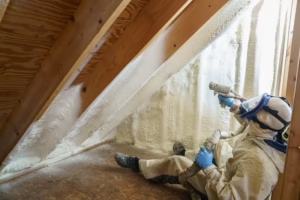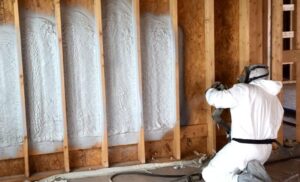Spray foam insulation solutions make homes feel better by addressing the root causes of discomfort that go beyond simple temperature control. The secret is its ability to act as both an insulator and a complete air barrier. By expanding to fill every crack and gap, it stops drafts, stabilizes temperatures, reduces humidity, and even dampens outside noise. This comprehensive approach creates a more pleasant and consistent indoor environment that traditional insulation materials often struggle to achieve.
Instead of just slowing heat transfer, spray foam stops the uncontrolled air movement that is the source of many common household complaints. This article, based on the real-world experience of insulation professionals, will break down exactly how spray foam’s unique properties translate into a home that simply feels better to live in.

Eliminating Drafts and Cold Spots
The most common reason a room feels uncomfortable is often air leakage. Small gaps around windows, electrical outlets, and plumbing penetrations can allow a surprising amount of outside air to infiltrate the home, creating drafts and cold spots. While traditional insulation like fiberglass batts has a good R-value, it doesn’t stop air from moving through and around it. Some estimates suggest that air leakage is responsible for up to 40% of a home’s energy loss.
Spray foam solves this problem at its source. When applied, it expands to create a solid, continuous barrier that seals the building envelope. This monolithic seal stops air movement in its tracks. The result is a home with remarkably even temperatures, free from the chilly drafts that cause people to constantly adjust the thermostat. Floors are warmer in the winter, and second-story rooms are easier to cool in the summer.
Bonus Tip: One of the biggest culprits for air leakage into an attic is the attic access hatch. A professional installer will always make sure this hatch is properly insulated and weather-stripped to complete the air seal.
Controlling Humidity for Better Comfort
In humid climates, a home can feel sticky and uncomfortable even when the air conditioner is running. This is because most air conditioners are better at lowering temperature than they are at removing moisture from the air. High indoor humidity can also contribute to musty odors and create an environment where mold can grow.
This is where closed-cell spray foam provides a huge advantage. It is a dense, rigid material that is impermeable to both air and water vapor. When applied in areas like crawl spaces or foundation walls, it creates a barrier that stops ground moisture from entering the home. This drastically lowers indoor humidity levels, making the air feel fresher and more comfortable. The air conditioner no longer has to work as hard to dehumidify the air, which can lead to even more energy savings.

Creating a Quieter Indoor Space
A home should be a retreat from the noise of the outside world. Spray foam insulation is an excellent sound-dampening material, helping to create a more peaceful indoor environment. Its air-sealing quality blocks airborne sound waves from traveling through walls, floors, and ceilings.
- Open-cell foam is particularly effective at absorbing sound. Its soft, spongy texture is great for reducing mid- to high-frequency noise. It’s an ideal solution for media rooms, home offices, or bedrooms that face a busy street.
- Closed-cell foam is also effective at blocking sound, particularly lower-frequency noises.
By reducing the intrusion of traffic noise, loud neighbors, or even the sound of plumbing running inside the walls, spray foam contributes to a calmer, less stressful living space.
How Insulation Tackles Common Comfort Problems
| Comfort Problem | Traditional Fiberglass | Spray Foam Insulation |
|---|---|---|
| Drafty Rooms | Does not stop air movement, allowing drafts. | Creates a complete air seal, eliminating drafts. |
| Uneven Temperatures | Prone to gaps and settling, creating cold spots. | Fills all cavities completely for consistent temperature. |
| High Humidity/Musty Smells | Can absorb moisture, potentially leading to mold. | Closed-cell foam blocks moisture and prevents mold. |
| Outside Noise | Offers minimal sound reduction. | Significantly dampens airborne noise for a quieter home. |
| Allergens/Dust | Air can pass through, carrying dust and pollen. | Blocks airborne pollutants from entering the home. |
Cleaner Air for a Healthier Home
The same air barrier that improves comfort and energy efficiency also improves indoor air quality. By sealing the thousands of tiny gaps in a home’s exterior, spray foam significantly reduces the amount of dust, pollen, and other outdoor pollutants that can get inside.
This can make a huge difference for family members with allergies, asthma, or other respiratory sensitivities. By creating a cleaner, healthier indoor environment, spray foam provides a benefit that goes far beyond what shows up on a utility bill. It contributes to the overall well-being of the people living in the home.
Things to Consider Before Making a Decision
To get the best results, homeowners should think about their specific goals and their home’s unique characteristics.
- Identify the Main Complaint: Is the primary issue a drafty living room, a noisy bedroom, or a damp basement? Pinpointing the main problem helps a contractor recommend the right type of foam and the best location to apply it.
- Plan for Ventilation: A very airtight home needs a way to get fresh air. This is a good thing, as it allows for controlled ventilation rather than random, dirty leaks. This may involve using bath fans and a kitchen range hood, or it could mean installing a mechanical ventilation system.
- The Installer Matters Most: The performance of spray foam is almost entirely dependent on the quality of the installation. It’s a complex process that requires a skilled, certified technician. Choosing a reputable, experienced contractor is the most important decision a homeowner will make.
Bonus Tip: Ask a potential contractor if they can perform or recommend a home energy audit with a blower door test. This test can actually measure a home’s air leakage rate, providing a clear before-and-after picture of the improvement.
Questions People Ask About Home Comfort and Insulation
Will spray foam get rid of musty smells in my basement?
Yes, it can be very effective. Musty odors are often caused by moisture and mold. Applying closed-cell spray foam to the basement or crawl space walls creates a moisture barrier that keeps the area dry and stops mold growth at its source, eliminating the smell.
Is one type of spray foam better for comfort than another?
It depends on the goal. For general thermal comfort and stopping drafts, both open-cell and closed-cell work well. For sound deadening, open-cell is often preferred. For moisture control in basements or crawl spaces, closed-cell is the only choice.
My second floor is always hotter than the first. Can spray foam fix this?
This is a very common problem that spray foam is great at solving. By applying foam to the attic roof deck, it stops the super-heated attic air from radiating down into the second-floor rooms, making them much cooler and easier to keep comfortable.
How long does it take to notice a difference in comfort?
The difference is usually immediate. Homeowners often report that the house feels different the very next day. The reduction in drafts and the stabilization of the indoor temperature are noticeable right away.
Does spray foam eliminate all outside noise?
While it significantly reduces noise, it won’t create a completely soundproof room. Sound can still travel through windows and the structure of the building itself. However, it makes a very noticeable difference in creating a quieter home.
Achieving a Better Living Environment
Ultimately, spray foam solutions make homes feel better by creating a more controlled and stable indoor environment. It’s a system that addresses comfort on multiple fronts, from temperature and humidity to air quality and acoustics. For homeowners looking to solve persistent comfort issues, it’s worth evaluating their specific needs and considering how a properly installed spray foam system could provide a lasting solution.
Getting a Professional Comfort Assessment
The first step to a more comfortable home is understanding the specific sources of the problem. For homeowners in the area, a professional assessment can provide clarity. A company like Raleigh Excel Spray Foam Insulation has the expertise to diagnose comfort issues and recommend the most effective solutions. To schedule a detailed evaluation of your home, their team can be reached at (919) 301-9435 or by sending an email to [email protected].
Reviewer: With nearly a decade in the spray foam insulation field, William Harris reviewed this post and provided guidance that reflects both technical understanding and real-world marketing experience.